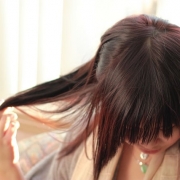It is a widely accepted misconception that hair thinning and balding are problems that are unique to the male gender. Though still not desirable, there is an expectation of sorts that hair loss comes with age for men, but not for women. In actuality, hair loss does not discriminate and a notably high percentage of women will experience some degree of thinning or balding during the course of their lifetime.
The single largest cause of hair loss in women has hereditary origins and is known as Female Pattern Hair Loss (FPHL). This type of loss is usually identified by thinning along the part rather than the thinning at the hairline that is frequent in its male counterpart, Male Pattern Hair Loss. The degree of a woman’s hair loss with FPHL is measured using the Savin Scale. According to a 2013 study conducted by the Department of Dermatology and Cutaneous Surgery at the University of Miami, some 21 million women in the United States alone are suffering from FPHL with 12% of women seeing signs by the time they are 30 and upwards of 30-40% of women dealing with FPHL in their 60s. These numbers are astounding when one considers how little female hair loss is discussed and acknowledged in today’s society!
In addition to FPHL, hair loss in women can also be attributed to a number of other causes including hormonal changes such as postpartum, birth control, or menopausal hair loss, extreme stress, regular overstyling, medications including, but not limited to, chemotherapy, underlying medical conditions such as hyperthyroidism or lupus, other known hair loss conditions, such as alopecia areata and trichotillomania, and the list goes on and on. It can seem a bit daunting to pinpoint a specific cause with so many possibilities, but a doctor or specialist can help individuals to understand their unique diagnoses and the potential solutions that are suited to their condition.
It is true that certain medications or procedures that are successful in men are not as broadly applicable in women. For example, some medications simply do not treat FPHL and others have female specific side effects that deter doctors from prescribing them. This is not to say that there aren’t a range of options for women dealing with hair thinning and loss, because there absolutely are. From hair transplantations and medications to laser therapies and high quality human hair wigs, opportunities for female hair restoration have never been so plentiful. Like diagnoses though, these prescribed treatments require the expertise of a specialist who understands how to accurately match the unique details of a woman’s hair loss with the dynamic impact and effectiveness of various solutions.
Last, but certainly not least, the social and emotional impact of hair loss in women is a fundamental piece of the challenge faced by females who are enduring ongoing thinning and baldness. For centuries, hair has played an enormous role in defining self-image, femininity, youthfulness, and beauty, and despite how one categorizes things like beauty and femininity, losing the opportunity to decide for oneself can be remarkably difficult to overcome. Frequently women seek to hide their thinning scalp with a new style or limited public exposure, and these temporary solutions leave them feeling vulnerable and isolated. By increasing awareness and initiating conversations about hair loss in women, there is potential to not only limit the loss and commence restoration, but also to minimize the negative social and emotional strains on females that are caused by unwanted hair-based changes. Women struggling with hair loss are not alone!
With more than 40 years experience, Van Scoy Hair Clinics has offered the latest advances in hair restoration for men and women in our state-of-the-art facilities in Cleveland, Columbus and Ashland, Ohio. Schedule a FREE hair loss and scalp analysis today.






 Women always want to have gorgeous hair and will just about anything to achieve it, including trying all the latest hair products or gadgets to get the look you want. Flat irons, hair product chemicals and harsh hair brush bristles are doing real damage to your hair. As women get older, their hair goes through changes and hair thinning is one of them especially has they enter their 50’s and 60’s. Hair experts believe this happen because of hormonal changes, but haven’t determined the exact cause of thinning hair as we age.
Women always want to have gorgeous hair and will just about anything to achieve it, including trying all the latest hair products or gadgets to get the look you want. Flat irons, hair product chemicals and harsh hair brush bristles are doing real damage to your hair. As women get older, their hair goes through changes and hair thinning is one of them especially has they enter their 50’s and 60’s. Hair experts believe this happen because of hormonal changes, but haven’t determined the exact cause of thinning hair as we age.